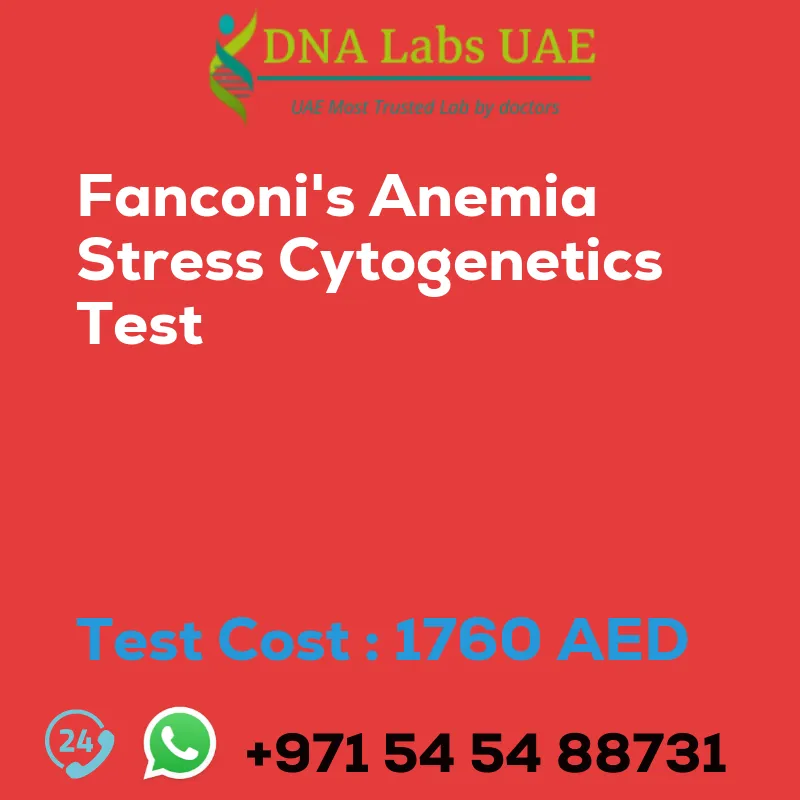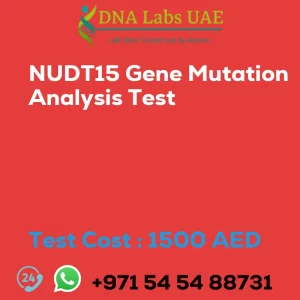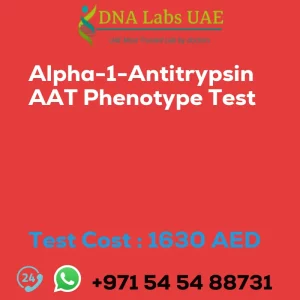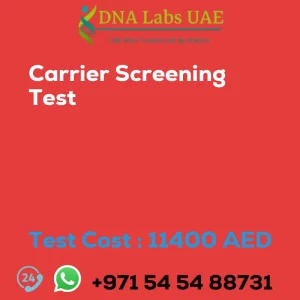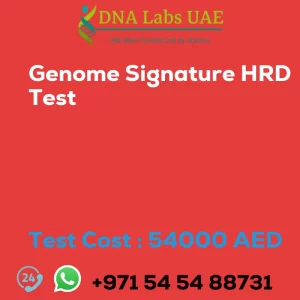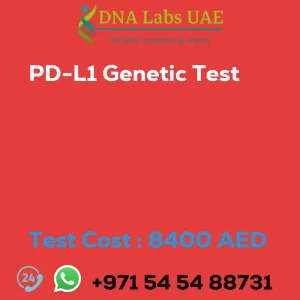FANCONI’S ANEMIA STRESS CYTOGENETICS Test
Test Details:
Fanconi’s anemia is a rare genetic disorder characterized by bone marrow failure, congenital abnormalities, and an increased risk of developing certain types of cancer. Stress cytogenetics testing is a diagnostic test used to evaluate the chromosomal stability of cells in response to DNA-damaging agents, such as certain chemicals or radiation. In the case of Fanconi’s anemia, stress cytogenetics testing is often used to assess the DNA repair capabilities of cells. Patients with Fanconi’s anemia have defects in the DNA repair pathway known as the Fanconi anemia pathway. This pathway is responsible for repairing DNA damage, and when it is impaired, cells are more prone to accumulating genetic abnormalities.
Test Components and Price:
- Test Name: FANCONI’S ANEMIA STRESS CYTOGENETICS Test
- Price: 1760.0 AED
Sample Condition:
5 mL (3 mL min.) whole blood from 1 Green Top (Sodium Heparin) tube. Ship at 18-22°C. DO NOT FREEZE. Give brief clinical history.
Report Delivery:
Sample Daily by 6 pm; Report 7 Working days
Method:
Stress Cytogenetics
Test Type:
Genetics
Doctor:
Hematologist
Test Department:
CYTOGENETICS
Pre Test Information:
Give brief clinical history.
Test Process:
During stress cytogenetics testing, cells from a patient’s blood or bone marrow sample are exposed to a DNA-damaging agent, such as a chemical called diepoxybutane (DEB) or mitomycin C (MMC). The cells are then cultured and examined for chromosomal abnormalities using various techniques, such as karyotyping or fluorescence in situ hybridization (FISH). If a patient has Fanconi’s anemia, stress cytogenetics testing may reveal characteristic chromosomal abnormalities, such as breaks, rearrangements, or gaps in the chromosomes. These abnormalities indicate that the patient’s cells are unable to repair DNA damage properly.
Importance of the Test:
Stress cytogenetics testing is an important tool in diagnosing Fanconi’s anemia and can help guide treatment decisions. It can also be used to monitor the effectiveness of certain therapies, such as bone marrow transplantation, in restoring normal DNA repair capabilities. It is important to note that stress cytogenetics testing is a specialized test that is typically performed in specialized laboratories or research settings. It requires expertise in cytogenetics and molecular biology techniques. Therefore, it is not routinely performed in all clinical laboratories.
| Test Name | FANCONI’S ANEMIA STRESS CYTOGENETICS Test |
|---|---|
| Components | |
| Price | 1760.0 AED |
| Sample Condition | 5 mL (3 mL min.) whole blood from 1 Green Top (Sodium Heparin) tube. Ship at 18-22?\u00f8C. DO NOT FREEZE. Give brief clinical history. |
| Report Delivery | Sample Daily by 6 pm; Report 7 Working days |
| Method | Stress Cytogenetics |
| Test type | Genetics |
| Doctor | Hematologist |
| Test Department: | CYTOGENETICS |
| Pre Test Information | Give brief clinical history. |
| Test Details | Fanconi’s anemia is a rare genetic disorder characterized by bone marrow failure, congenital abnormalities, and an increased risk of developing certain types of cancer. Stress cytogenetics testing is a diagnostic test used to evaluate the chromosomal stability of cells in response to DNA-damaging agents, such as certain chemicals or radiation. In the case of Fanconi’s anemia, stress cytogenetics testing is often used to assess the DNA repair capabilities of cells. Patients with Fanconi’s anemia have defects in the DNA repair pathway known as the Fanconi anemia pathway. This pathway is responsible for repairing DNA damage, and when it is impaired, cells are more prone to accumulating genetic abnormalities. During stress cytogenetics testing, cells from a patient’s blood or bone marrow sample are exposed to a DNA-damaging agent, such as a chemical called diepoxybutane (DEB) or mitomycin C (MMC). The cells are then cultured and examined for chromosomal abnormalities using various techniques, such as karyotyping or fluorescence in situ hybridization (FISH). If a patient has Fanconi’s anemia, stress cytogenetics testing may reveal characteristic chromosomal abnormalities, such as breaks, rearrangements, or gaps in the chromosomes. These abnormalities indicate that the patient’s cells are unable to repair DNA damage properly. Stress cytogenetics testing is an important tool in diagnosing Fanconi’s anemia and can help guide treatment decisions. It can also be used to monitor the effectiveness of certain therapies, such as bone marrow transplantation, in restoring normal DNA repair capabilities. It is important to note that stress cytogenetics testing is a specialized test that is typically performed in specialized laboratories or research settings. It requires expertise in cytogenetics and molecular biology techniques. Therefore, it is not routinely performed in all clinical laboratories. |

